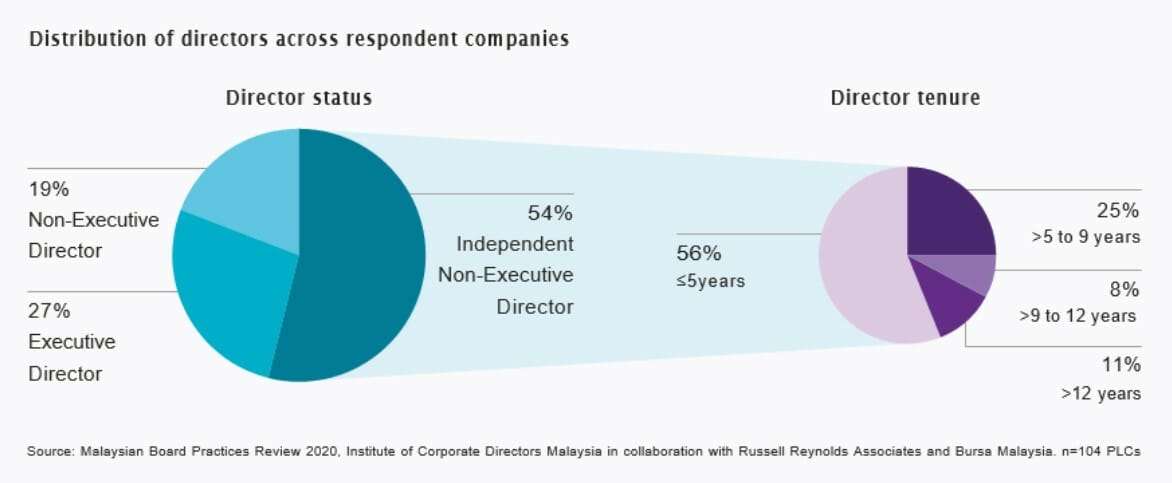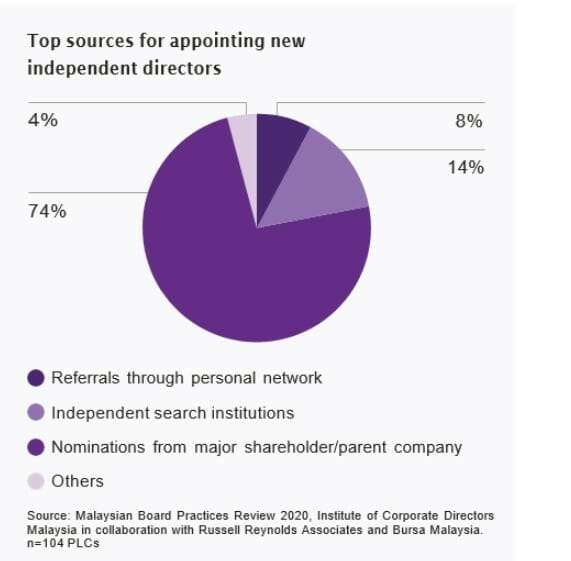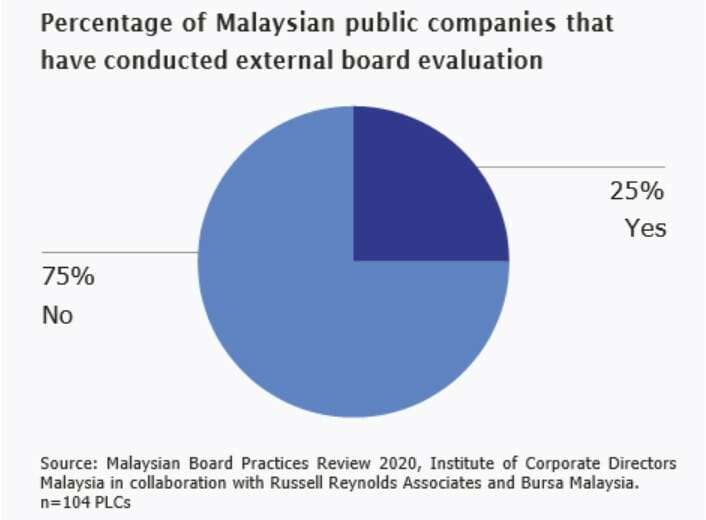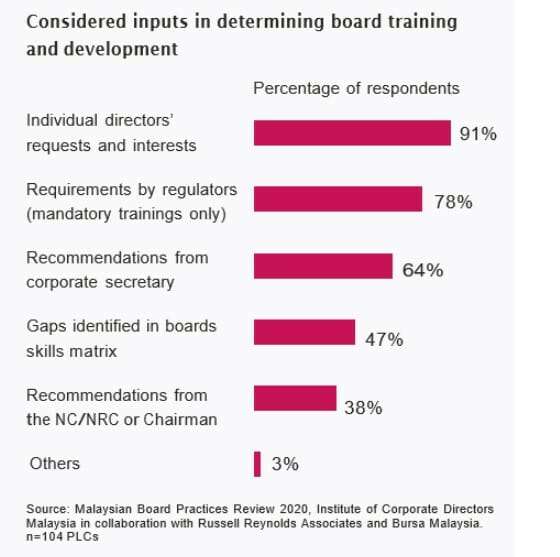Boards in Malaysia are facing unprecedented challenges. They are tasked with leading organizations through an increasingly complex business environment while managing an expanding range of expectations and scrutiny from various stakeholders. The regulatory and governance landscape has continued to change progressively in recent years to keep pace with trends, and boards have faithfully evolved along with these changes. To deliver the next cycle of high performance, boards must now shift their focus from required to deliberate evolution.
In the third quarter of 2020, Russell Reynolds Associates collaborated on a study of the current practices of boards of Malaysian public-listed companies (PLCs) with the Institute of Corporate Directors Malaysia (ICDM) and exchange regulator Bursa Malaysia. We focused on director appointments, board evaluations, and director evaluations. The study collated responses from 104 companies listed on the Bursa Malaysia across 12 different sectors, with a total of 799 board directors. It provides an in-depth look into the current state of board practices and how they fall along the spectrum from required compliance to best-in-class.
It revealed the following key insights:
- Long director tenures call for review of board independence
- Limited sourcing practices create opportunity to elevate and expand appointment processes for independent directors
- Lack of external board evaluations limit insight on board performance
- Board training and development could benefit from data-driven assessments of needs
In this summary, we present findings on the above key insights from the survey and provide examples of what boards could do in response.
Long director tenures call for review of board independence

Board independence has been a perennial topic of interest among stakeholders and corporate governance advocates, with much importance afforded to the role of independent directors in balancing diverse stakeholder interests. Among respondent companies, there was a solid representation of independent directors, with board composition on average comprising more than half independent non-executive directors (INEDs). However, approximately a fifth of all INEDs (19%) have tenures surpassing nine years, with 11% having already served 12 or more years.
Excessively long board tenures give rise to the threat of familiarity, which erodes a director’s ability to provide an objective viewpoint. Following the recent review of the Malaysian Code of Corporate Governance1, Bursa Malaysia plans to introduce a hard limit of 12 years for independent director tenure in listing requirements. Though the confirmed implementation timeline has yet to be finalized, issuance is targeted for the fourth quarter of 2021. As a result, we will likely see a fair bit of board renewal or reshuffle over the next couple of years.
Consistent vigilance to independent director tenure and awareness of avenues supporting board refreshment and renewal are of great importance to maintaining adequate independent oversight by the board and its directors. Based on our research (Going for Gold – the 2019 Global Board Culture and Director Behaviors Survey), the most effective boards have independent directors who show the following behaviors: (1) they are willing to constructively challenge management, where appropriate, (2) they possess the courage to do the right thing for the right reason, (3) they demonstrate sound business judgement, (4) ask the right questions, and (5) possess independent perspective and about “groupthink.”
Limited sourcing practices create opportunity to elevate and expand appointment processes for independent directors

Supplementing boards with high-performing, impactful, and independent directors is often a tall order given existing sourcing practices. Our survey results revealed that a significant majority of recently appointed INEDs were either identified by existing directors or senior management from their personal contacts or networks (74%), or through nominations from a major shareholder or parent company (14%). In contrast, a mere 8% of the most recently appointed INEDs were identified using executive search firms or independent institutions providing executive sourcing.
The results suggest that the selection and appointment of INEDs remains a discreet and enigmatic affair, with only parties closest to the organization (major shareholders and existing networks) included in the process for identifying, shortlisting and appointing independent directors.
Best-in-class board selection and sourcing, processes incorporate independent and unconventional sources to expand visibility and diversity of potential INED candidates. Based on our research, the most vibrant and successful boards globally set up a process in which they:
- Develop a long-term plan for how to add diverse and independent voices to their Top-performing boards have insight into overall board composition for the coming two to five years and plan at least 12 to 24 months ahead when looking for new board members.
- Think broadly about who could add value to the Broader searches can identify candidates with diversity of experience and of personal characteristics.
- At times, make strategic increases to board The best boards are not afraid to act opportunistically when they identify highly qualified diverse candidates, as competition for such directors can be fierce.
Lack of external board evaluations limit insight on board performance
The board evaluation is an underleveraged and often misconstrued tool that, when deployed correctly, has the potential to serve as an extremely powerful instrument in driving and delivering a high-performing board. In Malaysia, and across most parts of Asia, board evaluations remain primarily an encouraged, yet optional, initiative that typically run the risk of defaulting to a box-ticking, perfunctory exercise focused solely on compliance. The Malaysia Code of Corporate Governance (MCCG) encourages companies to conduct annual board evaluations, with large companies2 recommended to engage independent experts periodically to facilitate objective and candid board evaluations.

Findings from the study showed that a large percentage of companies were in fact conducting board evaluations on an annual basis. However, the overwhelming majority (75%) had never engaged an external facilitator for a board evaluation. Rather, the default remains for board evaluations to be facilitated internally, typically by one or a combination of the Nomination Committee (NC) / Nomination & Remuneration Committee (NRC), NC/NRC Chair, and the Corporate Secretary.
There is value that can be derived from engaging an external third-party consultant – including providing an independent, objective view on how the board functions. The perspective of external consultants can be particularly helpful in the complex task of identifying the collective strengths and skills of the board and examining them against the company’s long-term business goals and the shifting competitive landscape. This is one of many potential outcomes of a well-facilitated external board evaluation, supporting the board as it exercises its oversight and counsel to senior management.
Today, many of the best boards are looking for a broad, independent perspective on their performance and are working with outside advisors on these assessments. It is already an expectation of the UK Corporate Governance Code that companies will undergo an externally facilitated effectiveness review once every three years, and this requirement is widely viewed as an indicator of a board’s focus on continuous improvement in other jurisdictions. A systematic approach to board assessments will telegraph to investors, regulators and other key stakeholders that the board is future- oriented and performance-focused. It will drive board quality and performance.
Board training and development could benefit from data-driven assessments of needs

Insights from well-executed board evaluations or forward-looking skills matrix analyses could provide valuable inputs to identifying key areas that require training or development. Currently, although 91% of respondents considered the enhancement of board/director performance among their main objectives for board evaluations, less than half (47%) said they considered using inputs from a board skills matrix to inform training and development.
The best boards move from board assessment to perpetual board development. While a board assessment paints a picture of the current health and gaps of the board, the next step is to close the gaps through active individual and collective development.
For more information, see Board Transformation:Changing to Stay Ahead
Study responses suggest that typical approaches to directors’ training and development may be unstructured and often determined on an ad hoc basis. In cases where they are not, they tend to be regulatory-driven, rather than based on objective data.
A structured development pathway for directors based on specific competencies frameworks could help promote more deliberate and targeted knowledge and skills acquisition for directors. It could also support further development of high-performance teams within the board, by building on existing professional competencies and promoting good corporate governance practices.
A checklist for action planning
The recent updates to the MCCG marks a well-timed and necessary step in required evolution for corporate Malaysia. To shift from a mindset of required to deliberate evolution, the best boards will exercise greater consideration in designing, building, evaluating and cultivating the board and its directors. This shift will equip boards to maximize performance while leading organizations towards a more sustainable and resilient corporate Malaysia. Based on our research around top performing boards, we recommend the following as a checklist for ensuring best board practices:
- Are independent directors on your board able to play their roles and model the right behaviors?
- Does your board take a long-term, broad approach when it comes to board succession?
- Have you developed a systematic, effective approach to evaluate the future needs of the board, the current composition, and the effectiveness of individual and collective directors?
- Are you able to commit to a continual cycle and regime of board evaluation, development, renewal and re-evaluation against the changing needs of the external and internal environments over time?
To read the full Malaysian Board Review Practices 2020, click here.
To watch the launch sessions of the Malaysian Board Practices 2020, click here.
To read the executive summary of the Malaysian Board Review Practices 2020, click here.
AUTHORS
- Alvin Chiangis a member of the firm’s global Board & CEO Advisory Partners. He is based in Singapore.
- Stephen Langton leads the firm’s Board & CEO Advisory Partners in Asia Pacific. He is based in Singapore.
- Liwen Su is a member of the firm’s global Board & CEO Advisory Partners. She is based in Singapore.
- Marieke van der Drift leads knowledge management for Russell Reynolds Associates’ Board & CEO Advisory Partners in Asia Pacific. She is based in Singapore.

 5.0
5.0 





















